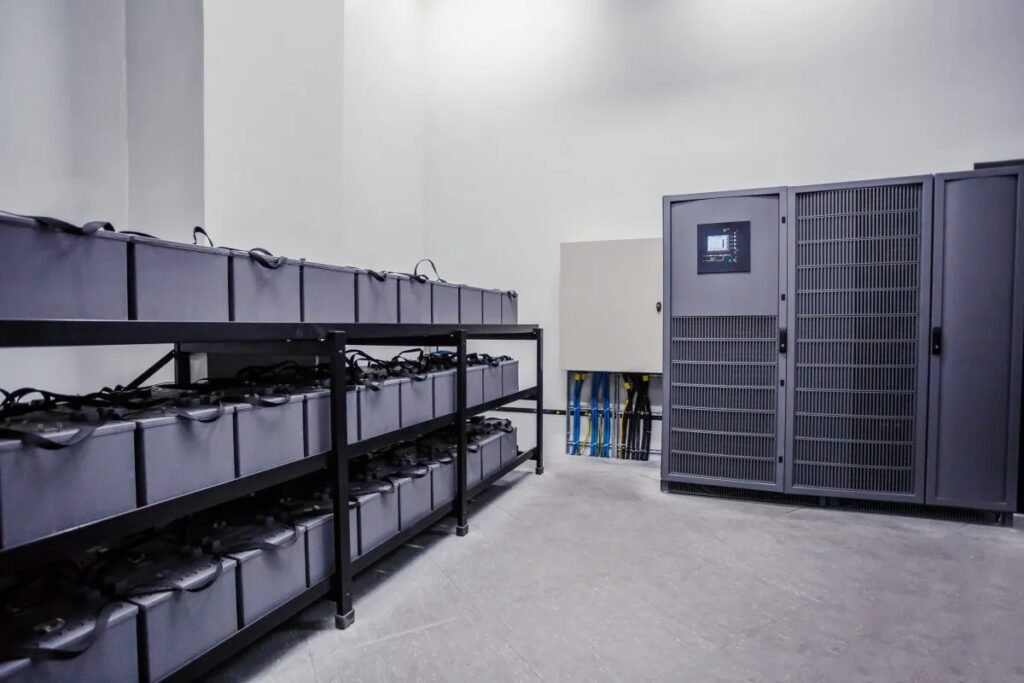UPS (Uninterruptible Power Supply) batteries are used across a wide range of industries and applications, ensuring that critical systems remain operational during power outages or voltage fluctuations. Here are the primary application areas of UPS batteries:
1. Data Centers
- Purpose: UPS batteries provide backup power to servers, storage systems, and networking equipment in data centers.
- Importance: They help prevent data loss, server downtime, and equipment damage due to sudden power interruptions.
- Application: In case of a power outage, UPS systems ensure that data centers can either continue operating until backup generators take over or have enough time to shut down critical systems safely.
2. Telecommunications
- Purpose: UPS batteries power telecom infrastructure such as base stations, central offices, and network nodes.
- Importance: Ensures uninterrupted communication services for mobile networks, internet service providers, and other telecom operations during power outages.
- Application: Backup power is essential for maintaining network connectivity, especially in rural areas or during emergencies when communication systems are crucial.
3. Healthcare (Hospitals and Medical Equipment)
- Purpose: UPS batteries are critical in healthcare environments, powering life-saving equipment such as ventilators, monitors, and surgical tools.
- Importance: Ensures that critical medical procedures are not interrupted, preventing life-threatening situations during power outages.
- Application: UPS systems are deployed in operating rooms, intensive care units, laboratories, and diagnostic centers to provide power continuity for essential equipment.
4. Industrial Manufacturing
- Purpose: In manufacturing environments, UPS batteries provide backup power to critical machinery, control systems, and automation equipment.
- Importance: Helps avoid production line downtime, equipment malfunctions, and loss of materials due to power outages or voltage fluctuations.
- Application: UPS systems support production processes in industries such as automotive, electronics, and pharmaceuticals, where precision and continuity are crucial.
5. Financial Institutions (Banks and ATMs)
- Purpose: UPS systems ensure that banking systems, ATMs, and financial transaction servers remain operational during power disruptions.
- Importance: Financial institutions rely on continuous power to maintain real-time transactions, data integrity, and secure customer access.
- Application: UPS systems are critical for ATM networks, online banking systems, and data centers that handle sensitive financial information.
6. Government and Military
- Purpose: UPS systems power critical government and military infrastructure, including communication systems, defense equipment, and security systems.
- Importance: Ensures national security, intelligence, and public safety during power disruptions, which could affect operations or emergency response systems.
- Application: Military bases, government buildings, and disaster recovery centers use UPS systems to maintain continuous operation.
7. Home and Small Office Use
- Purpose: UPS batteries provide backup power to personal computers, home networks, and entertainment systems.
- Importance: Protects against data loss and hardware damage during power surges or outages.
- Application: Commonly used in home offices to keep computers and modems running during short outages, preventing loss of work or connectivity.
8. Retail and E-Commerce
- Purpose: UPS systems ensure power continuity for point-of-sale (POS) systems, inventory management systems, and e-commerce platforms.
- Importance: A loss of power could disrupt sales, payment processing, and online orders, leading to financial losses and customer dissatisfaction.
- Application: Retail stores, warehouses, and online businesses use UPS systems to avoid operational interruptions during outages.
9. Emergency Services and Public Safety
- Purpose: UPS batteries power essential emergency systems, including 911 call centers, dispatch systems, and emergency response communication networks.
- Importance: Ensures that public safety services, such as police, fire, and ambulance services, can operate without disruption during power failures.
- Application: Backup power is essential for emergency operations centers and mobile command units to maintain service during critical situations.
10. Transportation and Logistics
- Purpose: UPS systems support critical infrastructure in the transportation and logistics industries, including air traffic control, railway signaling, and port operations.
- Importance: Power continuity is vital for maintaining smooth transportation operations, preventing accidents, and ensuring efficient logistics.
- Application: Airports, rail networks, shipping companies, and logistics hubs rely on UPS systems to manage control systems and communication during power interruptions.
11. Broadcasting and Media
- Purpose: UPS systems ensure continuous power for broadcasting studios, transmission equipment, and media servers.
- Importance: Broadcasting stations must maintain uninterrupted service, especially for news and emergency broadcasts.
- Application: TV and radio stations, streaming platforms, and content delivery networks rely on UPS systems to stay online during outages.


